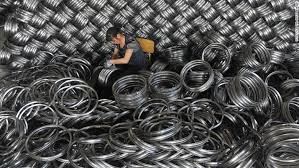Asia’s factories hit by pandemic-related supply disruptions

Asia’s factory activity lost momentum in August as a resurgence in coronavirus cases disrupted supply chains across the region, raising concerns faltering manufacturing will add to economic woes caused by slumping consumption.
Southeast Asia, a low-cost manufacturing hub for many global companies, was hit particularly hard with factory activity shrinking in Vietnam, Indonesia and Malaysia because of virus outbreaks and output suspensions, surveys showed on Wednesday.
In a worrying sign for the global economy, China’s factory activity also slipped into contraction in August for the first time in nearly 1-1/2 years as COVID-19 curbs, supply bottlenecks and high raw material prices weighed on output.
Export power-houses Japan, South Korea and Taiwan also saw manufacturing activity expand at a slower pace in August, a sign chip shortages and factory shutdowns in the region could delay a sustained recovery from the pandemic-induced slump.
“Virus disruptions add to the list of headwinds for the region’s producers, including semiconductor shortages and high shipping costs,” said Alex Holmes, emerging Asia economist at Capital Economics.
The weakness in Asia contrasts with conditions in Europe, where factories are mostly expected to maintain a brisk pace of expansion as its highly vaccinated economies reopen.
The surveys highlight the pandemic’s broadening damage in Southeast Asia, where soaring infections and subsequent lockdown measures have hurt both the service and manufacturing sectors.
Delta outbreaks in the region have caused supply chain headaches for the world’s largest manufacturers, many of which rely on auto parts and semiconductors made in low-cost bases such as Thailand, Vietnam and Malaysia.
“If the strict lockdown measures continue, Southeast Asia may find it hard to remain a global production hub,” said Makoto Saito, an economist at NLI Research Institute.
China’s Caixin/Markit Manufacturing Purchasing Managers’ Index (PMI) fell to 49.2 in August, from 50.3 in July, breaching the 50-mark that separates growth from contraction, a private sector survey showed on Wednesday.
The result was well below market expectations, underscoring the fragile nature of China’s recovery that had helped the global economy emerge from the pandemic-induced doldrums.
The private survey followed official PMI released on Tuesday, which showed the index falling in August but staying above the 50 mark.
Japan’s PMI eased to 52.7 from 53.0 in July with new export orders posting their first contraction since January. South Korea’s index also fell to 51.2 in August from 53.0 in July.
In Vietnam and Malaysia, activity was hurt by lockdown measures and rising infections that forced some factories to suspend operations.
Vietnam saw factory activity shrink to 40.2 from 45.1 in July. Malaysia’s PMI stood at 43.4 in August, up from 40.1 in July but staying well below the 50-threshold.
Once seen as a driver of global growth, Asian’s emerging economies are lagging advanced economies in recovering from the pandemic’s pain as delays in vaccine rollouts and a spike in Delta variant cases hurt consumption and factory production.
Growth in India’s factory sector activity also slowed as persistent pandemic-related weakness weighed on demand and output, forcing firms to cut jobs again following a brief recovery in July.
